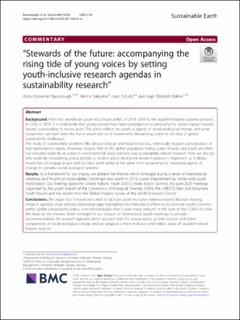| dc.contributor.author | Barraclough, Alicia Donnellan | |
| dc.contributor.author | Sakiyama, M | |
| dc.contributor.author | Schultz, Lisen | |
| dc.contributor.author | Måren, Inger Elisabeth | |
| dc.date.accessioned | 2021-08-18T07:25:39Z | |
| dc.date.available | 2021-08-18T07:25:39Z | |
| dc.date.created | 2020-09-23T11:59:24Z | |
| dc.date.issued | 2021 | |
| dc.identifier.issn | 2520-8748 | |
| dc.identifier.uri | https://hdl.handle.net/11250/2769971 | |
| dc.description.abstract | Background
From the worldwide youth-led climate strikes of 2018–2019 to the student-initiated austerity protests in Chile in 2019, it is undeniable that young people have been protagonists in pressuring for social change towards greater sustainability in recent years. This piece reflects on youth as agents of social-ecological change, and what researchers can learn from the rise in youth-led social movements demanding action in the face of global sustainability challenges.
The study of sustainability problems like climate change and biodiversity loss, intrinsically requires consideration of inter-generational equity. However, despite 50% of the global population being under 30 years old, youth are often not included explicitly as actors in environmental social sciences and sustainability-related research. Here we discuss why explicitly considering young people as distinct actors during the research process is important, as it allows researchers to engage in just and inclusive work whilst at the same time accounting for important agents of change in complex social-ecological systems.
Results
As a framework for our inquiry we present the themes which emerged during a series of international meetings and forums on sustainability challenges and youth in 2019, a year characterized by world-wide youth mobilization. Our briefing spans the United Nations Youth 2019 Climate Action Summit, the post-2020 meetings organized by the youth branch of the Convention of Biological Diversity (CBD), the UNESCO Man and Biosphere Youth forums and the results from the Global Shapers Survey of the World Economic Forum.
Conclusions
We argue that if researchers wish to facilitate youth-inclusive evidence-based decision making, research agendas must address knowledge gaps highlighted by institutional efforts to incorporate youth concerns within global sustainability policy, a recommendation that is even more relevant in the light of the COVID-19 crisis. We draw on the themes which emerged in our analysis of international youth meetings to provide recommendations for research agendas which account both for young actors as both passive and active components of social-ecological change and we propose a more inclusive and holistic study of coupled natural-human systems. | en_US |
| dc.language.iso | eng | en_US |
| dc.publisher | BMC | en_US |
| dc.rights | Navngivelse 4.0 Internasjonal | * |
| dc.rights.uri | http://creativecommons.org/licenses/by/4.0/deed.no | * |
| dc.title | “Stewards of the future: accompanying the rising tide of young voices by setting youth-inclusive research agendas in sustainability research” | en_US |
| dc.type | Journal article | en_US |
| dc.type | Peer reviewed | en_US |
| dc.description.version | publishedVersion | en_US |
| dc.rights.holder | Copyright The Author(s). 2021 | en_US |
| dc.source.articlenumber | 2 | en_US |
| cristin.ispublished | true | |
| cristin.fulltext | original | |
| cristin.qualitycode | 1 | |
| dc.identifier.doi | https://doi.org/10.1186/s42055-021-00041-w | |
| dc.identifier.cristin | 1832463 | |
| dc.source.journal | Sustainable Earth | en_US |
| dc.relation.project | Norges forskningsråd: 280299 | en_US |
| dc.identifier.citation | Sustainable Earth. 2021, 4, 2. | en_US |
| dc.source.volume | 4 | en_US |

